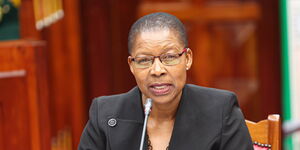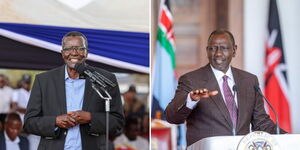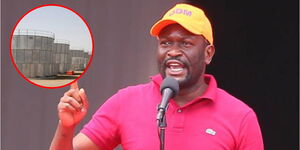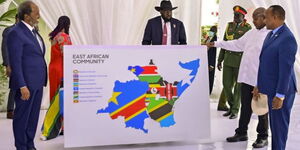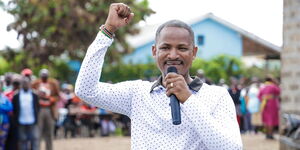As Kenya continues to campaign for Africa Union Commission Chairperson role, the competition for the position has escalated significantly in recent days.
With three contenders vying for the influential position, this article offers an in-depth profile assessment of each candidate and their respective experiences.
The race to attain the Chairpersonship of the African Union Commission (AUC) for the term spanning 2025 to 2029 has garnered considerable attention, drawing interest from across the Eastern African region of the continent.
This surge in interest follows a unanimous decision by the African Union Executive Council on March 15, stipulating that it is the Eastern Africa region's turn to nominate candidates for the esteemed position of Chairperson of the African Union Commission (AUC).
The pivotal decision transpired during the 22nd Extraordinary Session of the Executive Council of the AU, convened in Adidas Ababa.
At present, three formidable candidates have emerged as frontrunners in the race for Africa's paramount leadership role: Kenya’s Raila Odinga, Somalia’s Fawzia Yusuf Adam, and the latest entrant, Mahamoud Ali Youssouf of Djibouti.
Raila Odinga, Kenya
Kenya's nominee, Raila Odinga, stands prominently as a leading contender in the eyes of many observers. A civil engineer by profession, Odinga's familiarity with African politics is well-established, further bolstered by the decision of the East African heads of state to endorse a single candidate.
The EAC, headquartered in Arusha, Tanzania, comprises eight member states, including Burundi, the Democratic Republic of Congo, Kenya, Rwanda, Somalia, South Sudan, Uganda, and Tanzania.
Somalia's decision to nominate a candidate adds an intriguing dynamic to the race.
Raila Amolo Odinga, born in 1945 to Kenya’s first Deputy President, Oginga Odinga, boasts a rich political history in Kenya.
His tenure as Prime Minister from 2008 to 2013 was marked by significant national and regional engagements. Despite unsuccessful presidential bids, Odinga's commitment to democratic principles and human rights advocacy has remained unwavering.
Having served as the Member of Parliament for Langata Constituency and subsequently assuming the role of Leader of the Opposition since 2013, Odinga's political journey has been characterised by resilience and determination.
His activism dates back to the 1970s and '80s, during which he endured imprisonment without trial under accusations of subversion.
His contributions to Kenya's political landscape are notable, including his involvement in the drafting of the 2010 Constitution, hailed as a landmark achievement for the nation. Furthermore, his peace-building efforts and negotiation skills have played a crucial role in resolving conflicts and fostering stability.
In 2018, Odinga was appointed as the High Representative for Infrastructure Development at the African Union Commission, a testament to his regional influence and diplomatic standing.
However, his dismissal from this role in February 2023 following allegations of inciting violence underscores the complexities of his political career.
Fawzia Yusuf Haji Adam, Somalia
Fawzia Adam, a prominent Somali politician, has held significant governmental positions, including Minister of Foreign Affairs and Deputy Prime Minister of Somalia, during her tenure from November 4, 2012, to January 17, 2014.
Adam's political journey hasn't been without controversy. She once supported the secession of Somaliland from Somalia and even attempted to contest the presidency of Somaliland.
However, her Peace, Democracy, and Prosperity Party (NBD), registered in Somaliland, faced a ban before the 2010 elections due to Somalia's claim over Somaliland territory.
Despite this, Adam's advocacy for education in her birthplace, Hargeisa, Somaliland, garnered her significant acclaim.
In a notable shift in 2012, Adam relocated to Mogadishu, where she made history as the first female Deputy Prime Minister and Foreign Affairs Minister of Somalia.
Her nomination by Somalia for the chairperson position of the African Union Commission in January 2024 reflects her growing influence and diplomatic prowess.
Currently, Adam leads the National Democratic Alliance (NDA) Party in Somalia and serves as a federal MP. Additionally, she is pursuing studies in International Public Policy at the Johns Hopkins University School of International Studies.
If successful, Adam could become only the second female head of the AUC, following in the footsteps of South Africa's Nkosazana Dlamini-Zuma.
Mahamoud Ali Youssouf, Djibouti
Mahamoud Youssouf, born on September 2, 1965, is a distinguished Djiboutian diplomat with a longstanding career in government service. Notably, he has held the position of Minister of Foreign Affairs in Djibouti since 2005.
Youssouf's diplomatic journey began at Djibouti's Ministry of Foreign Affairs, where he played a pivotal role in heading its Arab affairs department during the 1990s. His expertise and dedication led to his appointment as Ambassador to Egypt, serving from 1997 to 2001.
Recognizing his diplomatic prowess, Youssouf was entrusted with greater responsibilities, first as Minister-Delegate for International Cooperation on 4 July 2001, before ascending to the position of Minister of Foreign Affairs and International Cooperation on 22 May 2005.
His diplomatic engagements extended beyond the African continent, including a notable visit to Japan in 2006.
In a testament to his diplomatic leadership, Youssouf served as the Chairman of the 129th Ordinary Session of the Council of Foreign Ministers of the Arab League in 2008, further solidifying his reputation as a respected figure in regional diplomacy.
With the term of the incumbent AU Commission Chairperson, Moussa Faki Mahamat, concluding in early 2025 after serving a maximum of two four-year terms, the stage is set for a new leader to emerge.
The electoral process requires candidates to secure at least two-thirds of the votes from member states during the general assembly elections, highlighting the significance of garnering broad support across the continent.
While the race to replace Faki continues to heat up, Kenya's influence on the continent is coming in handy for Raila. In April, President Ruto launched a shadow diplomacy campaign in West Africa to drum up support for Odinga.
Raila has received endorsement by at least countries including; Uganda, Rwanda, Tanzania, Burundi, South Sudan, the DRC, South Africa, Ghana, Angola, and Guinea Bissau.
He will require to woe more states to win the candidacy that would see him out of the 2027 general elections.



